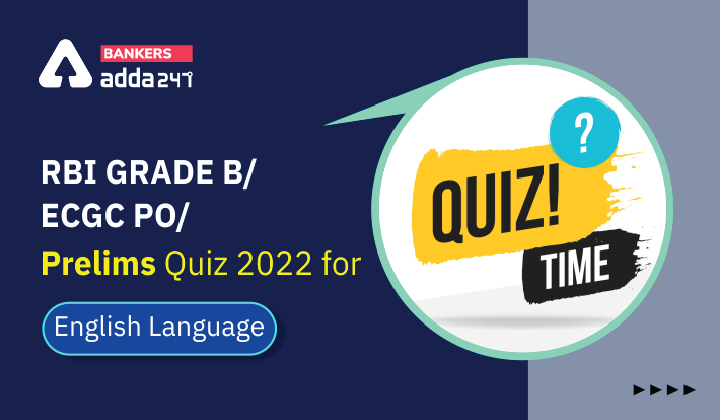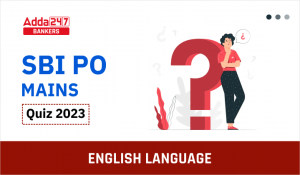
TOPIC: Miscellaneous
Directions (1-5): Rearrange
the following six sentences (A), (B), (C), (D), (E) and (F) in the proper
sequence to form a meaningful paragraph, then answer the questions given below
them.
(A) Do
the devices that make it possible to do so many things at once truly raise our
productivity or merely help us spin our wheels faster?
(B) More
important, they’re exploring what can be done about it – how we can work
smarter, live smarter and put our beloved gadgets back in their proper place,
with us running them, not the other way around.
(C) The
dinging digital devices that allow us to connect and communicate so readily
also disrupt our work, our thoughts and what little is left of our private
lives.
(D) They
have begun to calculate the pluses, the minuses and the economic costs of the
interrupted life – in dollars, productivity and dysfunction.
(E) What
sort of toll is all this disruption and mental channel switching taking on our
ability to think clearly work effectively and function as healthy human beings?
(F) Over
the past five years, psychologists, efficiency, experts and
information-technology researchers have begun to explore these questions in
detail.
Q1. Which
of the following should be the FIRST sentence?
(a) A
(b) B
(c) C
(d) D
(e) E
Q2. Which
of the following should be the SECOND sentence?
(a) A
(b) B
(c) C
(d) D
(e) E
Q3. Which
of the following should be the THIRD sentence?
(a) A
(b) B
(c) C
(d) D
(e) F
Q4. Which of the following should be the FIFTH sentence?
(a) A
(b) B
(c) C
(d) D
(e) E
Q5. Which
of the following should be the SIXTH (LAST) sentence?
(a) A
(b) B
(c) C
(d) D
(e) E
Directions (6-10): In each of these questions,
a sentence has one or two blanks, each indicating that the something has been
omitted. Beneath the sentence are given four words or a set of word. Choose the
word or the set of words for each blank that best fits the meaning of the
sentence as a whole.
Q6. The
_____________ successfully repelled every _____________ on the city.
(a)
defenders–comment
(b)
citizens–onslaught
(c)
thieves–robbery
(d)
judge–criticism
(e) None
of these
Q7. He
was _____________ very clever, but he _____________ performed excellently.
(a)
certainly–obviously
(b)
never–also
(c)
not–always
(d)
rarely–seldom
(e) None
of these
Q8. A _____________
analysis to these substances will show that they differ _____________.
(a)
random–minutely
(b)
detailed–essentially
(c)
careful–completely
(d)
final–Structurally
(e) None
of these
Q9. When
the _____________ polished the stones, they gleamed with a breath–taking
brilliance.
(a)
graphologist
(b)
cosmetologist
(c)
lapidary
(d)
beagle
(e) None
of these
Q10. As
_____________ head of the organisation, he attended social functions and civil
meetings, but had no _____________ in the formulation of company policy.
(a)
hypothetical–vote
(b)
titular–voice
(c)
nominal–competition
(d)
former–pride
(e) None
of these
Directions (11-15): Below each sentence are
given four possible substitutions for the bold part. If one of them (a), (b),
(c) or (d) is better than the bold part, indicate your response against the
corresponding letter (a), (b), (c) or (d). If none of the substitutions
improves the sentence, indicate (e) as your response. Thus a ‘No’ improvement’
response will be signified by the letter (e).
Q11. I
laid all the facts before him so that he could make his own judgement.
(a) laid
all the facts in front of him
(b) lay
all the facts before him
(c) lay
all the facts in front of him
(d) did I
lay all the facts before his
(e) No
improvement
Q12. If
only she had told me about her problem I would have helped her.
(a) would
help
(b) could
help
(c) had
helped
(d) would
not help
(e) No
improvement
Q13.
Apollo was worshipped as long as the Roman Empire continued.
(a) was
continued
(b) ruled
(c)
lasted
(d) did
not exist
(e) No
improvement
Q14. The
patient could have been saved if he had been taken to the hospital in
time.
(a) could
be saved
(b) could
save
(c) had
been saved
(d) can
saved
(e) No
improvement
Q15.
Knowing very little English, it was difficult to converse with the
foreigner.
(a) I
found it difficult to converse
(b) to
converse was difficult
(c)
conversing was difficult
(d) It
was not easy to conversed
(e) No
improvement
Solutions:
S1.
Ans.(a)
Sol. The
correct sequence is AEFDBC; A
S2.
Ans.(e)
Sol. E
S3.
Ans.(e)
Sol. F
S4.
Ans.(b)
Sol. B
S5. Ans.(c)
Sol. C
S6. Ans.(b)
Sol. You
cannot repel (drive away) comments or criticism, only an attack or onslaught
can be repelled. So, the pair of most suited words would be citizens–onslaught.
S7. Ans.(c)
Sol.
Since, there is a but between the two parts of the sentence, the passive words
should be antonyms. (a) and (d), thus, get eliminated never–also do not fit the
sense of the sentence properly thus, not –always are the most suitable fillers
for the given sentence.
S8.
Ans.(c)
Sol. An
analysis must be careful, it may or may not be detailed and final. It certainly
should not be random, thus, (a) is eliminated. ‘Of the remaining careful’ is
the most appropriate choice for this sentence.
S9. Ans.(c)
Sol.
Graphologist is one who studies handwriting, while a cosmetologist is a person
skilled in the art of cosmetics, Beagle is a species of dog and lapidary is a
person skilled in polishing of stones.
S10. Ans.(b)
Sol. Hypothetic means something that is assumed
and titular means a ruler without real authority. So, titular – voice is the
appropriate choice of words.
S11. Ans.(e)
Sol.
This sentence is correct none of the changes suggested will improve it. So, the
option (e) is the correct answer.
S12.
Ans.(e)
Sol.
This sentence is grammatically correct none of the changes suggested will
improve it. So, the option (e) is the correct answer.
S13.
Ans.(c)
Sol.
The correct sentence should be read, ‘Appollo was worshipped as long as the
Roman empire ‘lasted’ therefore, option (c) is the correct answer. The reason
being Apollo was worshipped till the Roman empire was there therefore ‘lasted’
fits in best, the other two options was continued or ruled are incorrect.
S14.
Ans.(e)
Sol.
No improvement
S15. Ans.(e)
Sol.
No improvement




 English Quizzes For SBI PO Mains 2023 - ...
English Quizzes For SBI PO Mains 2023 - ...










